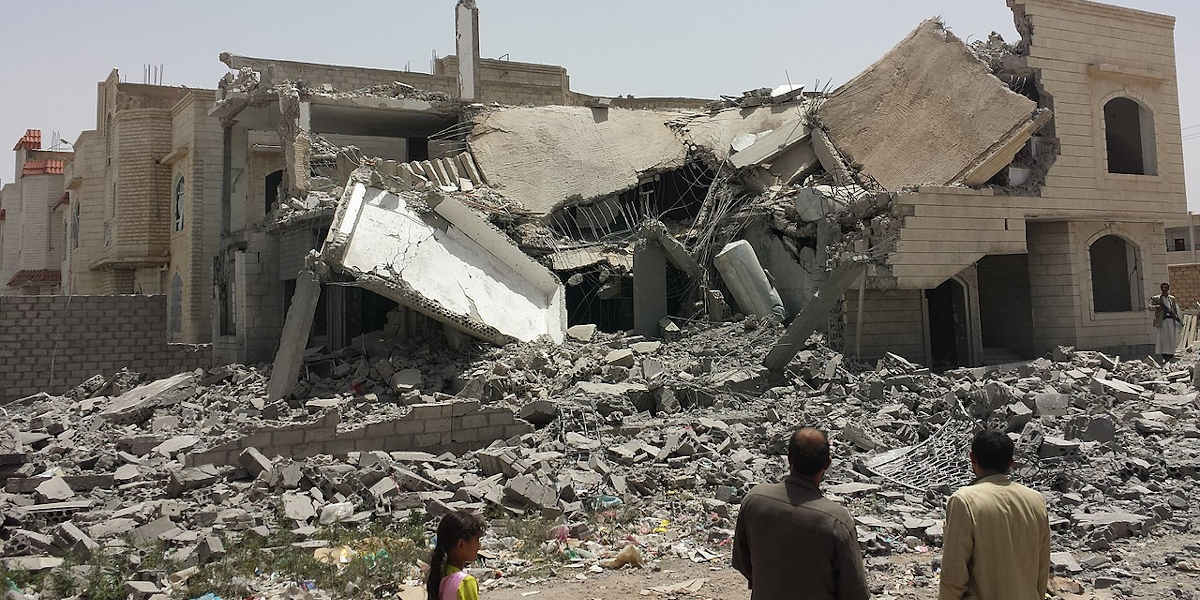‘The worse stories are the children – when you see the malnourished children. Some lose their lives before they even get to the hospital’.
This is how Rabab Abdullah, a former economics professor, described the humanitarian catastrophe in Yemen to a journalist at NPR. ‘It is not war… I see children eating tiny pieces of bread soaked in water. That’s all they have for breakfast, lunch and for their dinner’.
The crisis in Yemen is the worst in the world. And it is getting worse. A horrifying study from Save the Children found that up to 85,000 children under the age of five have died of starvation since the Saudi-led bombing of Yemen began in 2015. The country has been brought to the brink of famine, with major humanitarian organisations have warned that, unless there is rapid change, a further 14 million people are at risk of starving.
The crisis has been hugely exacerbated by the ongoing bombardment, which has killed thousands of people and destroyed vital infrastructure. Over 70% of all imports to Yemen come through the port of Hodeidah, this includes aid. It has served as a vital lifeline for Yemeni people throughout the conflict. However, the Saudi-imposed blockade and renewed violence in the town over the last few weeks has seen imports reduced by 50%.
Britain’s complicity
Responding to the escalating crisis, the Foreign Secretary, Jeremy Hunt, Tweeted ‘Amongst other news raging we must not forget the heart-breaking famine in Yemen – the UK has a special responsibility as Yemen pen-holder on the security council’.
Hunt is right about the UK having a special responsibility. This is not just because of its pen-holder status at the UN, but also because of the complicit role that the UK government has played in the war. Since the war began in March 2015, Hunt and his predecessors have licensed almost £5 billion worth of fighter jets and bombs to the Saudi military. The arms sales have been underpinned by a deep well of political support and close military collaboration.
Around six thousand BAE employees and 200 MOD personnel are based in Saudi Arabia providing continuous maintenance, support, and training to the Royal Saudi Air Force, without which support large parts of the air force could not operate. Yet, despite growing pressure, and despite the central role of UK-made weapons in the conflict, Hunt has repeatedly refused to countenance ending the arms sales.
Jamal Khasshoggi’s murder and its aftermath
One factor that has pushed the issue further up the political agenda is the murder of journalist Jamal Khasshoggi in the Saudi Consulate in Turkey. A huge amount of evidence has emerged that directly links the regime to the murder. There can be little doubt that people connected to the upper echelons of the Saudi dictatorship did not just know of the killing, they are directly implicated in it.
The murder has further exposed the hypocrisy at the heart of UK foreign policy. It has put Ministers like Hunt in a tricky position. On one hand they obviously want to look like free speech defenders that don’t tolerate targeted murder, but at the same time they have continued to prioritise arms sales and cozy relations with the Saudi Monarchy at all costs.
Of course, it shouldn’t take the murder of a journalist for the arms dealing government to question if it is right to sell weapons to a brutal dictatorship while it wages an awful war on another state. However, it has forced some to begin taking action.
The immediate aftermath has seen some positive changes made across Europe, with some governments, such as Finland, Holland and Denmark, announcing steps to curb arms sales to the Saudi-led coalition for use in Yemen. These arms sales should never have been agreed in the first place, but if they keep to their promises then any steps to stop them could set a very welcome precedent.
Likewise, the United States Senate has just voted to curb US support for the war in Yemen. The vote is non-binding, and will be followed by votes in the House and be subject to a Presidential veto, but it has forced an unprecedented attention on the US role in the war.
The crisis continues
Despite the momentum for change, there are a lot of reasons to be cautious. Very often in these cases the rhetoric is greater than the actions that follow. The German government, for example, has very publicly implied that it is seeking to end all arms sales to the Saudi-led coalition, but to date has only made some short-term suspensions. This will hopefully be expanded into a complete ban, but until it has we should remain sceptical of its claims.
Next April the Court of Appeal in London will consider the legality of UK arms sales to Saudi forces for use in Yemen. This follows a case brought by Campaign Against Arms Trade. If the case is successful it could have a major impact on the war and on UK arms sales. Regardless of the result, if things continue as they are then thousands of people will die between now and then.
After almost four years of war, the need for a political solution in Yemen is greater than ever. Arms dealing governments like the UK and US have a particular responsibility to work towards peace. That doesn’t just mean calling for a ceasefire, it also means ending the arms sales and political support that have fuelled this terrible war.










